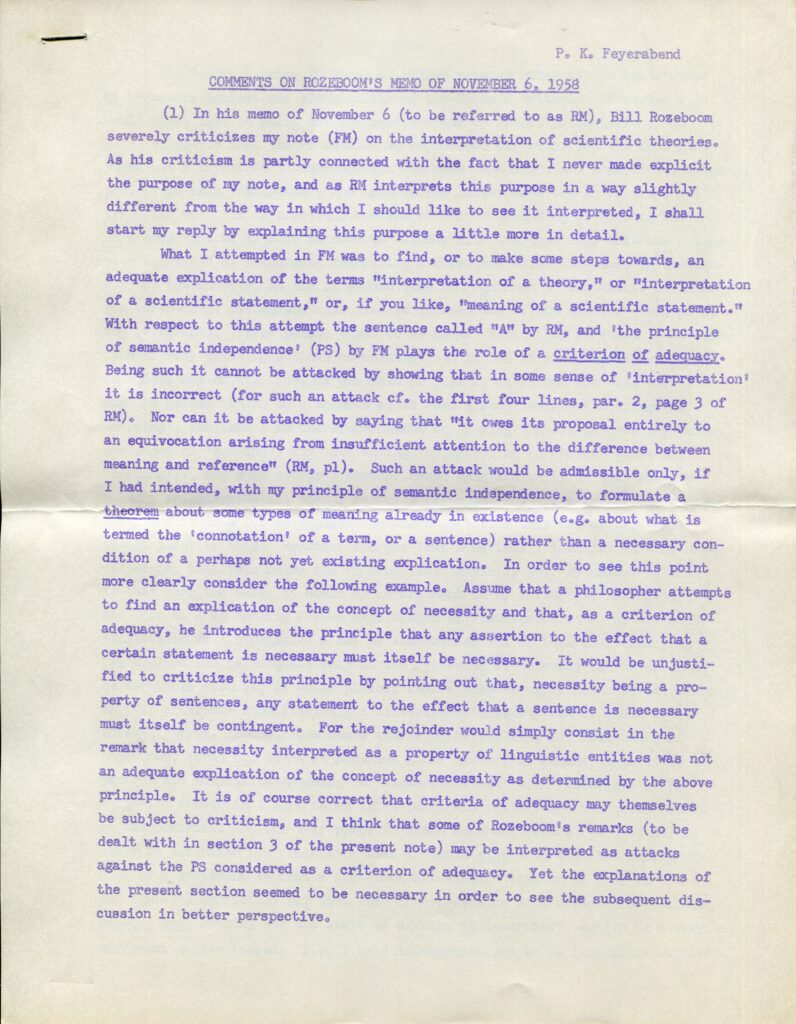In 1957 Feyerabend first went to the Minnesota Center for the Philosophy of Science in Minneapolis, where he met Herbert Feigl, Carl Hempel, Ernest Nagel, Hilary Putnam, and Adolf Grünbaum, among others. Around this time, many of Feyerabend’s most important early papers were published, including several of those collected here:
(1) ‘Eine Bermerkung zum Neumannschen Beweis’, offprint from Zeitschrift für Physik, Bd. 145, S. 421-423 (1956).
(2) ‘A Note on the Paradox of Analysis’, offprint from Philosophical Studies, Vol. VII, no 6, December 1956, pp. 92-6.
(3) ‘On the quantum-theory of measurement’, offprint from Colston Studies, Vol. IX, University of Bristol, 1957, pp. 121-30.
(4) ‘An Attempt at a Realistic Interpretation of Experience’, offprint, Meeting of the Aristotelian Society, 10th Feb. 1958, pp. 143-70.
(5) ‘Comments on Rozeboom’s Memo of November 6, 1958’ (unpublished, mimeographed typescript, stapled, 10pp).
(6) ‘On the Interpretation of Scientific Theories’ (mimeographed draft typescript with underlining and correction, stapled, 8 pp., published in 1960).
(7) ‘Das Problem der Existenz theoretischer Entitäten’, offprint from Probleme der Wissenschaftstheorie, Festscrhift für Victor Kraft, Springer, 1960, pp. 37-72
(8) Review of The Structure of Science by Ernest Nagel, stapled offprint from British Journal for the Philosophy of Science, Vol. 17, 1961, pp. 237-49, signed by Feyerabend.
(9) ‘Reply to Criticism, Comments by Paul K. Feyerabend on Smart, Sellars and Putnam’, offprint from Boston Studies in the Philosophy of Science, Vol. 2, 1965, pp. 223-61.
(10) Half-page typed précis of a Feyerabend seminar ‘Continuity and Discontinuity of Changes in Nature’, Adolf Grünbaum’s copy with his signature, undated.
‘Feyerabend will be remembered as an influential critic of positivism and empiricism, and as a co-founder of the notion of incommensurability. He will continue to be revered as champion of pluralism, who reshaped widely held views on the scientific method, and who argued that scientific progress needs to be protected from dogmatism through the proliferation of a plurality of competing views. His challenges to the objectivity of science continue to be fertile as a founding force for the mounting postmodernist movement in the philosophy of science and in the newer discipline of science studies. Together with Popper, Kuhn, and Lakatos, he was one of “The Big Four” philosophers of science of the second half of the twentieth century’ (Dictionary of Modern American Philosophers, Thoemmes Press, 2005).

